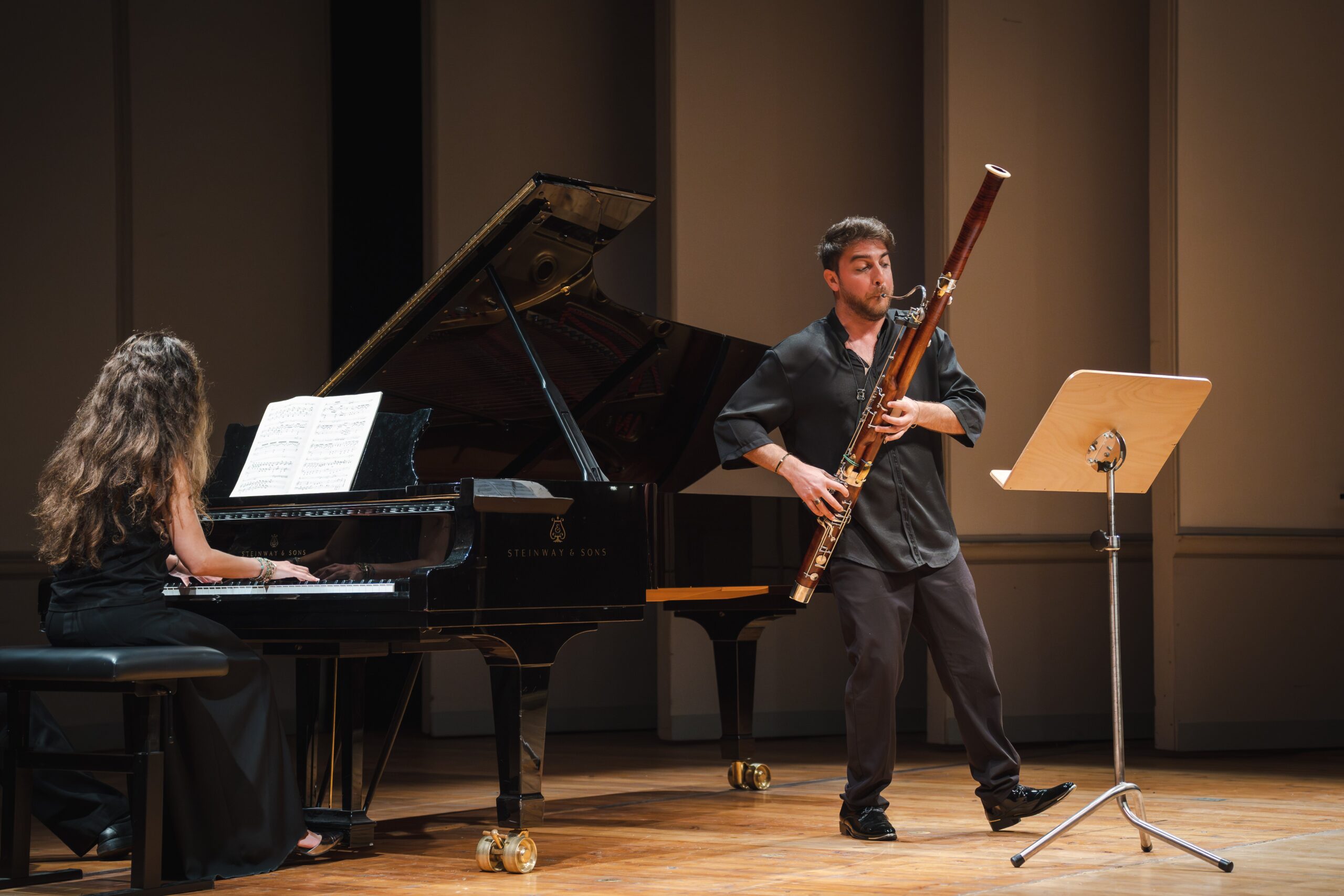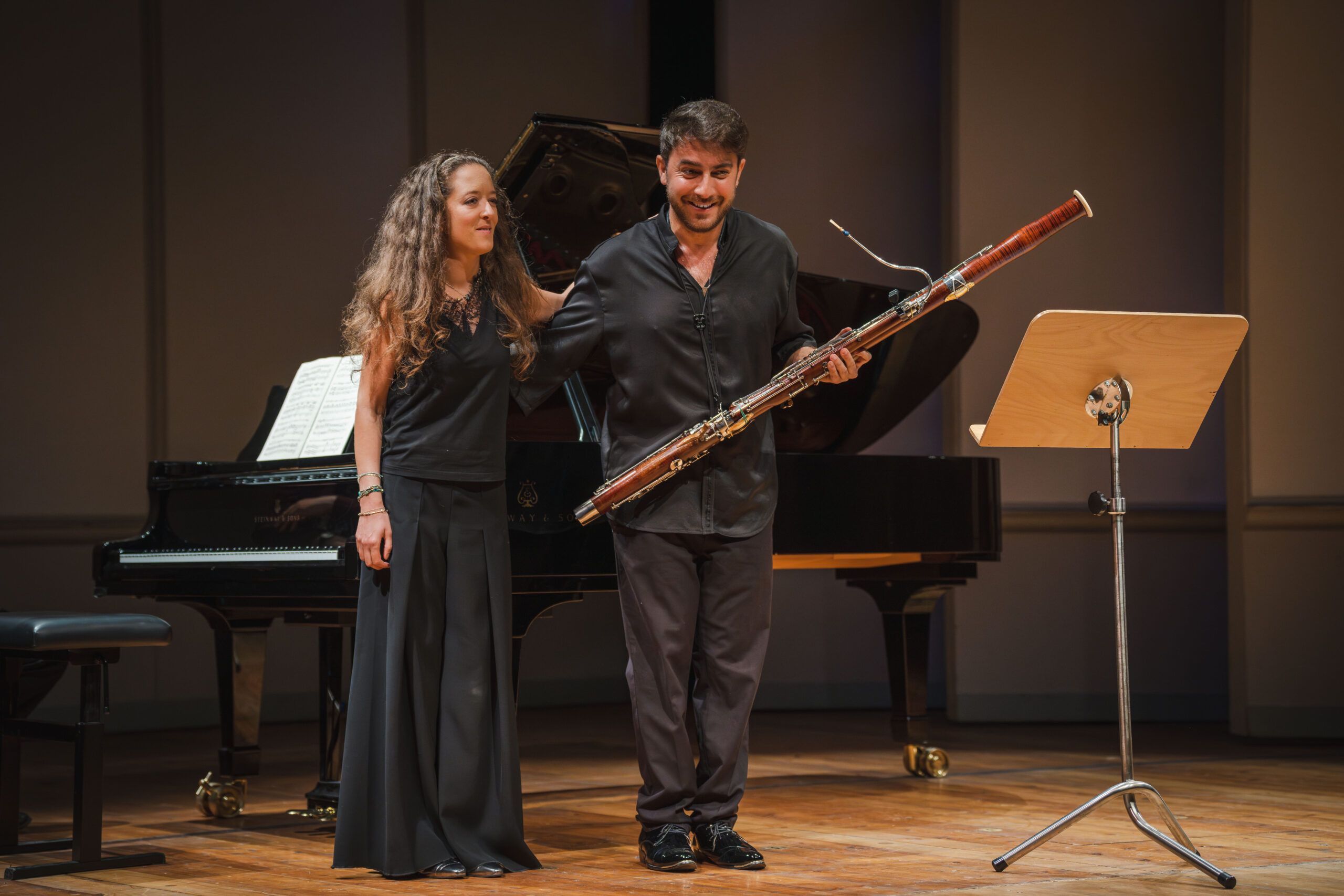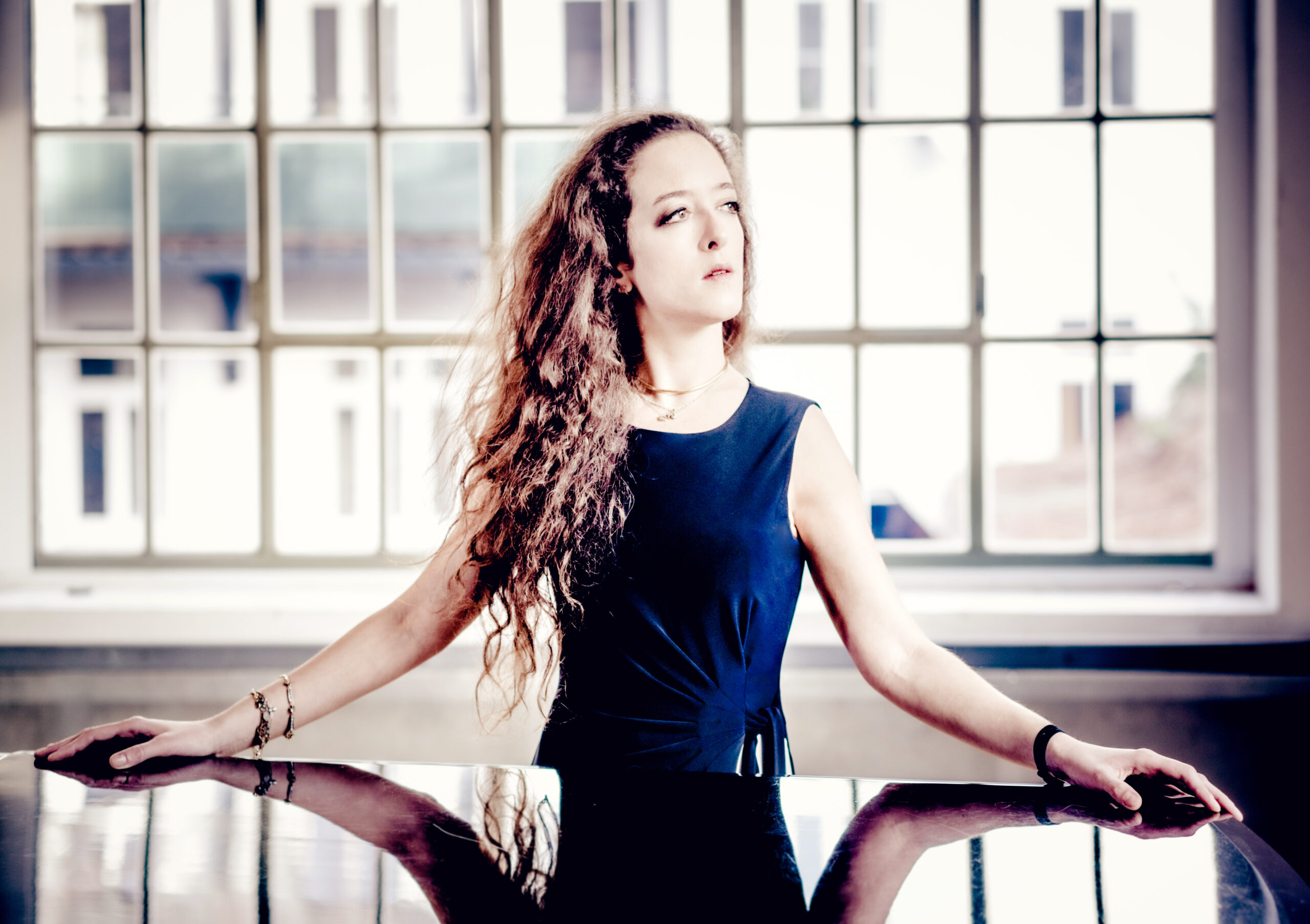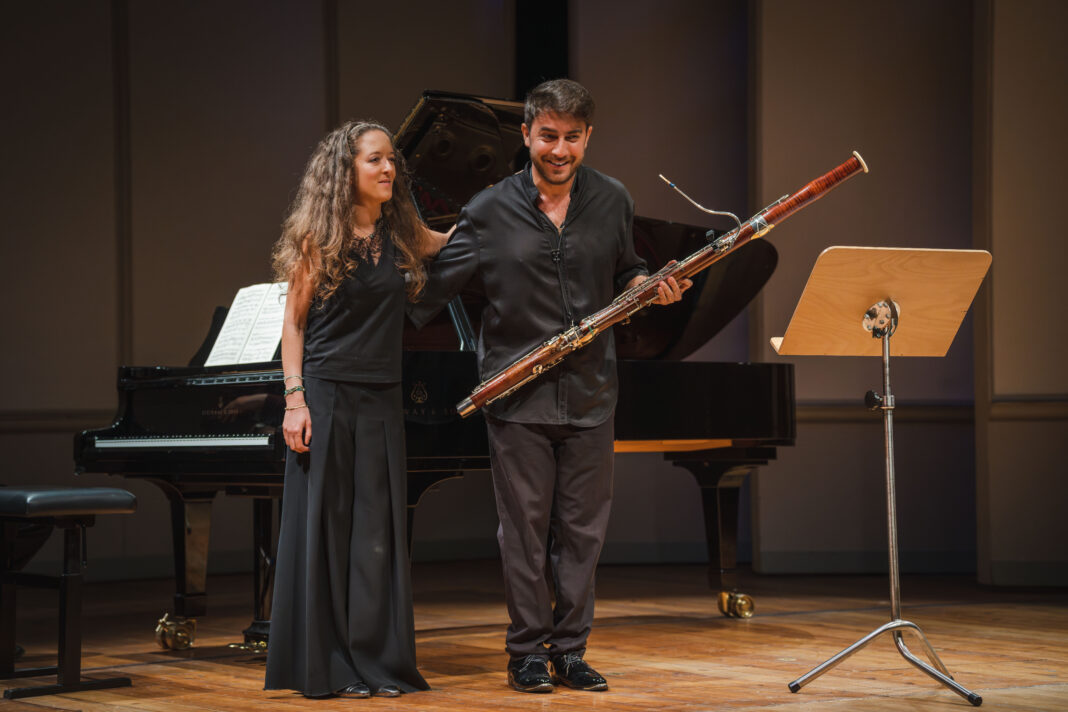By Fotios Kaliampakos
Pianist Lily Maisky and Bassoonist Mavroudes Troullos talk to the Hellenic News of America about their artistic partnership, their recent performance at the prestigious Konzerthaus-Berlin and their musical and cultural roots in the traditions of Eastern Europe and Cyprus respectively.
How did you decide to pursue a career, or better, a life, in music?
MT: I grew up in an environment where classical music was everywhere and all the time. Either from my father, who taught me music theory and composition or my mother who taught me the piano. So, I was exposed to classical music at a very young age. At the age of 13 I started the bassoon and since then it has been a roller coaster of experiences.
LM: Similarly to Mavroudes, I grew up totally immersed in classical music and the world that surrounds it. Attending concerts and festivals from a very young age and having the great privilege to be surrounded by inspiring musicians. My parents guided me in my musical development and it all happened very naturally, it never even occurred to me to do something else!

How did your particular interest in classical music come about? Why bassoon? Why piano?
MT: I do not know if I chose classical music myself. I guess the fact that my parents are musicians somehow drove me to this path. As a kid I always enjoyed art and I was occupied with painting, music or even angioplasty. Maybe playing an instrument was more fun so at the age of 13 I found myself practicing the bassoon every day at least a couple of hours. The bassoon was a present from my dad at the age of 12. I think he liked the idea of having in the family double reed instruments. Therefore, some years later he gave my sister an oboe. Since the beginning I was attracted to the bassoon. I liked that it was an unusual instrument and I was impressed by its deep, full and colourful sound. I felt I identified with it.
LM: As I said previously, I was guided and encouraged by my parents to begin learning the piano at a very young age. I strongly believe that it is an extremely beneficial developmental key for any child in terms of brain development to learn a musical instrument and piano is particularly accessible for small children. I did not choose the piano as an instrument to be honest, however I don’t regret this one bit, if I had to choose I would definitely choose the piano. My father always had the dream to form a piano trio with his children so it all worked out in the end as we have been performing more and more regularly as a trio since well over a decade now.
Where did you study? How is your art affected by your studies and performing experiences in Germany?
MT: At the age of 18 I moved from Cyprus to Athens where I studied at the Conservatory and the year after to Leipzig for my Bachelor’s degree. Those years were important as I established a stable bassoon technique and music understanding. Later on, I continued my education in Brussels for my master degree. But that was only the beginning. The ‘greatest education’ comes only on stage and undoubtedly performing with great musicians, collecting different experiences is an endless source of inspiration.
LM: I attended the Purcell School of Music in London from the age of 14, combining regular academic studies with specialised musical education. This was the best scholastic experience that I could have hoped for at that age. I started performing quite actively soon after concluding my studies there and never ended up going to Conservatory, rather taking private lessons and masterclasses and I feel very strongly that I learnt the most from experience with so many different and great chamber music partners. Indeed Germany is one of the most active countries for Classical Music and I have performed really a lot there over the years. The level of professionalism and enthusiasm in every single German city town or even smaller villages that you discover is really encouraging.
What is your creative process? How do you approach a work new to you and how a new (contemporary) work?
MT: I approach a composition, no matter old or new, as a home where I can live in and grow. The architect of this home is the composer. With great respect to the creator and his ‘hidden’ instructions in between the notes I try to find myself in his music and translate it, if possible, in sounds. Of course, the more works you have played, the easier it will be to understand different styles and get into different composer’s mind.

LM: It really depends from one piece to the next, it’s never the same process. It depends how challenging the score is to dissect in the beginning stages, how technically heavy and demanding it is… In any case as a pianist it’s always a kind of commitment to learn a new work, your world ends up revolving around that piece for a considerable amount of time. I always try and get as many occasions as possible to perform a new major work in order to really solidify it, in the end that’s the only way to get to really know a piece is to play it many times and when it comes to chamber music if possible with many different partners.
Is there room for innovation when playing a piece like a Beethoven sonata, something that so many interpreters have approached before? What is the meaning of playing the great works of the past for an artist? For the audience? What does classical music mean for the “mere mortals” beyond the two hours of pleasant time in a concert?
MT: I am not sure if there is room for ‘so called’ innovation when playing a piece that has already been performed a lot before, but I am sure that all great artists approach a work from their own perspective. That already gives to the music a new interpretation. For example, if you take recordings of Sibelius violin concerto with Gitlis, Heifetz or Oistrakh, they are all so loyal to the text but still so different and convincing. That is actually amazing. Great music will always be alive and fresh with great art workers. Interpretation is a product of a life time full of learning, thinking and experiencing. In other words, emotions that the interpreter should find and identify with the personal language of each composer and loyally offer to the audience.
LM: It depends what one means by innovation, I guess in a sense, yes! As Mavroudes said each person gives their own individual interpretation, or hopefully their own interpretation as to what it is that the composer wanted and indicated in the score. One has to at least tempt to respect the text to the best of one’s abilities… However it is really very personal and I believe that if the performer is a true artist, they are giving a very profound part of themselves through their musical interpretations and manners of expressing this. It is actually a beautiful thing, a spontaneous moment in time shared among the people in that place at that very moment.
What are your latest performances/recordings and what are your future plans?
MT: This season I had the pleasure to work with different ensembles and orchestras performing from concertos by Vivaldi to Stravinsky’s L’histoire du Soldat, chamber music and recitals with my dear friend and colleague Lily Maisky. In September I shall have the release of my second album together with the harpist Rachel Talitman. An album with music based on traditional Jewish themes and motives written for us by composer Anna Segal. This coming season, I will have my first collaboration as soloist with the contemporary ensemble Sturm und Klang performing a newborn concerto dedicated to me by composer Denis Ivanizde. In addition, I am looking forward to future recitals with Lily, Roberta Brambilla (harp), meeting new friends in chamber music projects and collaborations with orchestras such as Gent Symphony Orchestra and Antwerpen Camerata.
LM: My last CD recording is on Deutsche Grammophon called “Twentieth Century Classics” but it’s already not a recent release anymore. Since then I have made quite a few video recordings and feature in Aleksey Igudesman’s recent film release in celebration of Rachmaninoff’s 150th birthday called “Breaking Rachmaninoff.” Otherwise a recording with my brother and father, fellow members of the Maisky Trio is long overdue. We have a couple of tracks and videos but are planning our first complete recording as a trio for next year. Otherwise many concert performances, quite a few summer festivals coming up mostly in Europe but also some tours of China and Korea are planned for the 23/24 season. 2023 marked my father’s 75th birthday and 50 years since emigrating from the USSR and embarking on his career in the West, we celebrated and will continue to celebrate throughout the year with some special concerts in Europe, including Berlin where we also indeed just made our German début with Mavroudes at the beautiful Konzerthaus.
Tell us more about what brought you together and about the special experience to perform in one such historical venue as the Berliner Konzerthaus.
MT: Few years ago, I had the idea to create a variable ensemble with different friends I met last years based in Brussels. Through common friends, I met Lily and it was very natural to join the ensemble. Soon after I asked her if she would like to join me for a bassoon and piano recital in Belgium. Since then, I am very glad that we are enjoying sharing the stage in different places in Belgium, France, Cyprus and indeed recently in Germany. We had our debut as a duo at the beautiful Berliner Konzerthaus performing works by Bartok, De Falla and Saint Saens. Konzerthaus Berlin is considered a temple of classical music, home to the Konzerthausorchester Berlin and leading artists around the world. It was a great experience and honor for me.
LM: Mavroudes pretty much already said it all! My brother joined the ensemble that Mavroudes founded in Brussels already before I did, I ended up joining in a bit later but finally we began playing more and more duo with Mavroudes and are slowly expanding our répertoire, mostly comprised of transcriptions that we find work well for bassoon and piano but also some original works. We also became very friendly throughout the process of working together and it is great fun to get to travel and perform together.
I cannot help but also ask you about your artistic relationship to your father Mischa Maisky, who is a legend.
LM: I am very close with my father, we have always shared similar perspectives on things and this is also the case in our artistic relationship, we have great complicity and it really just goes easily and naturally. We basically hardly need to rehearse at all, not only obviously because we play together since 18 years now already but it was actually like that from the start, that’s why we decided to form the duo already quite early. I have learnt so incredibly much from playing with him, I feel so incredibly lucky…
How do your roots from the Ukraine and Cyprus affect your art? Ukraine is in the core of the history of Western music, whereas Cyprus musical history is very different.
MT: Cyprus has rich history in traditional music. Indeed, at first place the island was not familiar with Western music and had a strong influence from the East. But not only, later on many other civilizations passed from the island shaping the culture and of course music. Today I find Cyprus has made great steps coming closer to classical music and I hope it will keep going. Undoubtedly my major education and development was in Germany/Belgium but I can’t forget that I met good teachers in both Greece and Cyprus such as Patrick Gallois and Kalervo Kulmala.

LM: My father’s parents were both from the same town in Ukraine, but he himself was born in Riga, Latvia, part of the Soviet Union at the time. He then pursued his musical studies in Saint Petersburg and Moscow before emigrating to Israel, and then Europe where he met my mother who is American but also with Eastern European backgrounds. I was born in Paris and grew up in Belgium. To make a long story short I am quite a mix but feel very European and do feel my Easter European heritage. I have visited Ukraine, Latvia and Russia many times to perform and it is touching to see how they hold much more importance to art and music than we do in Western Europe, or at least in my experience.







